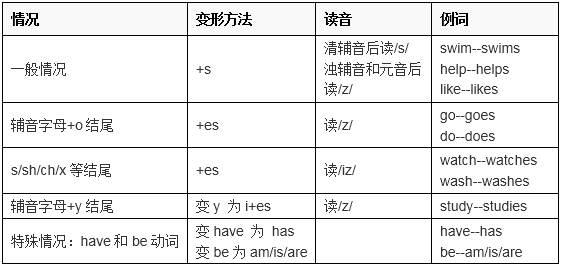获取更多中考政策、方法、学习资料等 , 每天与您相约!
时态无疑是初中英语最重要的语法内容 , 学好时态基本就拿下了语法的半壁江山 。 今天总结的八种时态是大家在初中阶段必学必考的 , 一定要加倍重视哦! (温馨提示: 不要忘记收藏哦 , 用时好找)
英语八大时态:
1
一般现在时
标志:动词原形

文章图片
1. 表示经常性或习惯性动作 , 常与表频度的时间状语连用:
She often speaks English.
I leave home for school at 7 every morning.
2. 表示现在的状态、特征、职业、能力、感觉等:
He seems to feel a bit down today.
He works as a driver.
3. 表示真理、客观存在、科学事实或用于格言警句中:
Shanghai lies in the east of China.
Columbus proved that the earth is round.
Where there is a will, there is a way.
4. 表示现在瞬间的动作:
Here comes the bus!
5. 表示将来
1) 表按规定、计划、安排将要发生的动作(仅限于某些表示“来、去、动、停、开始、结束、继续”等的趋向动词) , 可以与表示未来的时间状语搭配使用 。 常见的用法是:飞机、火车、轮船、汽车等定期定点运行的交通状况 。 如:
The next train leaves at 3 o’clock this afternoon.
How often does the shuttle bus run?
2) 在时间和条件状语从句中常使用一般现在时表示将来发生的事情:
When Bill comes (不用will come), ask him to wait for me.
I shall go there tomorrow unless I’m too busy.
2
一般过去时
标志:动词过去式

文章图片
*闭音节:元音字母a, e, i, o, u如果发字母本来的音则称为开音节 , 否则称为闭音节 。
1. 表示过去某时所发生的动作或存在的状态 , 常与表示过去的时间状语连用(e.g. yesterday, this morning, just now, a moment ago, in May, last night / year / week, once upon a time, the other day, before …, when …, in the past等) 。 如:
Jim rang you just now.
Liu Ying was in America last year.
2. 表示过去经常或反复发生的动作 , 特别是used to do表达的句型 , 本身表示的就是过去常常 。 如:
When I was a kid, I often played football in the street.
She used to visit her mother once a week.
*注意区分sb. used to do sth.(某人过去常常做某事 , 此处to是动词不定式标志符号)和sb. be used to sth./doing sth.(某人习惯于某物/做某事 , 此处to是介词) 。
3. 代替一般现在时 , 表示一种婉转、客气、礼貌、商量的语气 。 此用法仅适用于少数动词(如want, hope, wonder, think, intend等)及情态动词could, would 。 如:
I wondered if you could have a word with me.
I hoped you could help me with my English.
Would you mind my sitting here?
4. 虚拟语气中用一般过去时表示现在或将来时间的动作或状态 。 常用句型有:
It is time that sb. did sth. “某人该做某事了”
would rather sb. did sth. “宁愿某人做某事”
3
一般将来时
标志:will / shall + 动词原形
1. 表示将来发生的动作或存在的状态 , 通常与表示将来的时间状语连用(e.g. tomorrow, next week, in the future等) 。 如:
We shall have a lot of rain next month.
My husband will come back in a few days.
2. 表示倾向性和习惯性:
Fish will die without water.
When it gets warmer, the snow will start to melt.
推荐阅读
- 申论|初中数学|实际问题与二次函数专题讲解+例题解析+专项训练,收藏
- 高中|高中九大学科思维导图最全汇总,高中三年都适用!(收藏)
- 中学业|宿州市2022年初中学业水平体育与健康学科考试工作方案
- 国企|中国电信春招,研究生25万人,本科生18万人,往届生均有机会报名
- 中小学|在小学和初中,为啥同届孩子中年龄大的成绩更好?出生月份有优势
- 宿迁学院|初中生“身高标准”,很多学生未达标,家长:要重视
- 上海交通大学|书面作业少了,实践作业多了, 初中生的寒假作业是多了还是少了?
- 教师|初中生黑板报走红,惊艳无比非常绚丽,美术功底让大家羡慕
- 中考|寒假不补课,初中生要想弯道超车,这几点很重要
- 作文|初中物理|机械运动中探究杠杆平衡条件考点的解析,实验题常考











